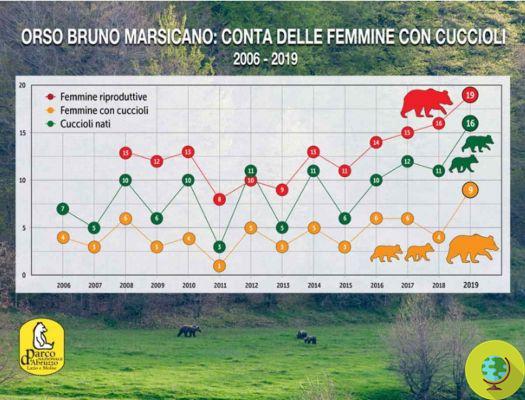2019 was a record year for the Marsican brown bear family: at least 9 females have reproduced in the past months and 16 cubs have been counted.
He is about to end up run over, his mother saves him2019 was a record year for the Marsican brown bear family: at least 9 females have reproduced in the past months and 16 cubs have been counted.
16! 2019 was a record year for the Marsican brown bear family of the Abruzzo, Lazio and Molise National Park. Here at least 9 females have reproduced in the past months and 16 are the puppies counted by the monitoring staff.
It is the fourth consecutive year that they have been registered 10 to 16 new born in the population, while 2019 also marks an increase in the number of reports of females with young outside the Park. All this bodes well for the survival of adult females and their expansion into new areas.
“The importance of reproductive females emerges clearly also in the light of a recent study published in The European Zoological Journal - declares President Cannata. The Marsican bear will be able to emerge from the real risk of extinction if it is possible to increase, even slightly, the survival of adult females inside, but above all outside the Park, where the commitment of all the institutions concerned and of the citizens is necessary. It is obviously also important to maintain the high natural food availability throughout the range ".

And it seems that the path taken is the right one. In 2019, the first case of a known female was observed who reproduced only two years after the last calving and after successfully completing the previous litter. And not only that: from the Roveto Valley to Castel di Sangro, then outside the park, 17 reports of females with puppies have been verified that have involved at least 5 different municipalities and could correspond to at least 6 family units, some of which are already included in the Park Authority count, while in past years a maximum of 1-2 have been registered family units.
"These results obtained are very important for the Marsican brown bear population, which is reduced in number and with a small number of adult females, moreover with one of the lowest reproductive rates observed in brown bears".
It is estimated, in fact, that on average a female Marsican bear is able to give birth to 0.2 cubs every year with an interval between births of 3-4 years. Furthermore, on average, only 50% of those born survive the first year. To all these must be added other critical factors, such as the density of bears in the Park, equal to 3-4 bears per 100 square km, which is among the largest observed for brown bears.
"In these conditions it is reasonable to expect that natural mechanisms of numerical regulation of the population will take over that act on the reproductive capacity of females, for example with the inhibition of estrus in a few years, or on a lower survival of the puppies, with an increase in cases of infanticide by adult males. Neither can genetic defects linked to the high level of consanguinity of individuals be excluded, with consequent reduced survival capacity of the puppies themselves ".
It goes without saying, in light of this, that then for a female to move away to a new area could also be advantageous, if only, however, the theme of conservation were re-proposed (once again), which also passes through the areas outside those of the Park, where a commitment by institutions and citizens would be useful both to maintain "natural food availability throughout the area" and to road safety.
Read also:
- 11 new Marsican bear cubs: good news from the Abruzzo National Park!
- Marsican bear at risk of extinction: only 40/50 specimens remain


























